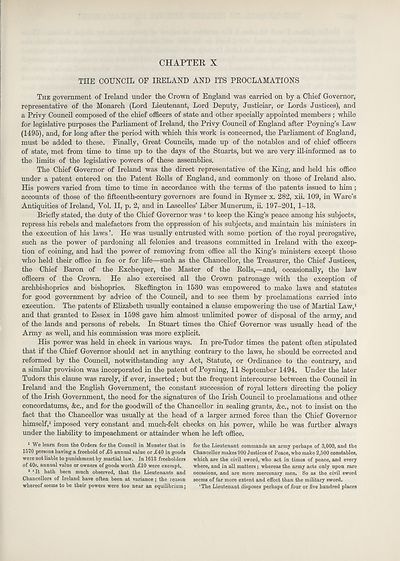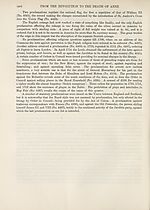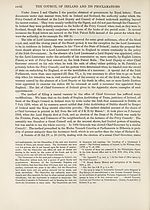Bibliography of royal proclamations of the Tudor and Stuart sovereigns and of others published under authority, 1485-1714 > England and Wales
(129) Page cxvii
Download files
Complete book:
Individual page:
Thumbnail gallery: Grid view | List view

CHAPTER X
THE COUNCIL OF IRELAND AND ITS PROCLAMATIONS
The government of Ireland under the Crown of England was carried on by a Chief Governor,
representative of the Monarch (Lord Lieutenant, Lord Deputy, Justiciar, or Lords Justices), and
a Privy Council composed of the chief officers of state and other specially appointed members ; while
for legislative purposes the Parliament of Ireland, the Privy Council of England after Poyning’s Law
(1495), and, for long after the period with which this work is concerned, the Parliament of England,
must be added to these. Finally, Great Councils, made up of the notables and of chief officers
of state, met from time to time up to the days of the Stuarts, but we are very ill-informed as to
the limits of the legislative powers of these assemblies.
The Chief Governor of Ireland was the direct representative of the King, and held his office
under a patent entered on the Patent Rolls of England, and commonly on those of Ireland also.
His powers varied from time to time in accordance with the terms of the patents issued to him ;
accounts of those of the fifteenth-century governors are found in Rymer x. 282, xii. 109, in Ware’s
Antiquities of Ireland, Vol. II, p. 2, and in Lascelles’ Liber Munerum, ii. 197-201, 1-13.
Briefly stated, the duty of the Chief Governor was ‘ to keep the King’s peace among his subjects,
repress his rebels and malefactors from the oppression of his subjects, and maintain his ministers in
the execution of his laws’. He was usually entrusted with some portion of the royal prerogative,
such as the power of pardoning all felonies and treasons committed in Ireland with the excep¬
tion of coining, and had the power of removing from office all the King’s ministers except those
who held their office in fee or for life—such as the Chancellor, the Treasurer, the Chief Justices,
the Chief Baron of the Exchequer, the Master of the Rolls,—and, occasionally, the law
officers of the Crown. He also exercised all the Crown patronage with the exception of
archbishoprics and bishoprics. Skeffington in 1530 was empowered to make laws and statutes
for good government by advice of the Council, and to see them by proclamations carried into
execution. The patents of Elizabeth usually contained a clause empowering the use of Martial Law,1
and that granted to Essex in 1598 gave him almost unlimited power of disposal of the army, and
of the lands and persons of rebels. In Stuart times the Chief Governor was usually head of the
Army as well, and his commission was more explicit.
His power was held in check in various ways. In pre-Tudor times the patent often stipulated
that if the Chief Governor should act in anything contrary to the laws, he should be corrected and
reformed by the Council, notwithstanding any Act, Statute, or Ordinance to the contrary, and
a similar provision was incorporated in the patent of Poyning, 11 September 1494. Under the later
Tudors this clause was rarely, if ever, inserted; but the frequent intercourse between the Council in
Ireland and the English Government, the constant succession of royal letters directing the policy
of the Irish Government, the need for the signatures of the Irish Council to proclamations and other
concordatums, &c., and for the goodwill of the Chancellor in sealing grants, &c., not to insist on the
fact that the Chancellor was usually at the head of a larger armed force than the Chief Governor
himself,2 imposed very constant and much-felt checks on his power, while he was further always
under the liability to impeachment or attainder when he left office.
1 We learn from the Orders for the Council in Munster that in for the Lieutenant commands an army perhaps of 3,000, and the
1570 persons having a freehold of £.h annual value or £40 in goods Chancellor makes 900 Justices of Peace, who make 2,500 constables,
were not liable to punishment by martial law. In 1613 freeholders which are the civil sword, who act in times of peace, and every
of 40s. annual value or owners of goods worth £10 were exempt. where, and in all matters ; whereas the army acts only upon rare
3 ‘ It hath been much observed, that the Lieutenants and occasions, and are mere mercenary men. So as the civil sword
Chancellors of Ireland have often been at variance ; the reason seems of far more extent and effect than the military sword,
whereof seems to he their powers were too near an equilibrium; ‘The Lieutenant disposes perhaps of four or five hundred places
THE COUNCIL OF IRELAND AND ITS PROCLAMATIONS
The government of Ireland under the Crown of England was carried on by a Chief Governor,
representative of the Monarch (Lord Lieutenant, Lord Deputy, Justiciar, or Lords Justices), and
a Privy Council composed of the chief officers of state and other specially appointed members ; while
for legislative purposes the Parliament of Ireland, the Privy Council of England after Poyning’s Law
(1495), and, for long after the period with which this work is concerned, the Parliament of England,
must be added to these. Finally, Great Councils, made up of the notables and of chief officers
of state, met from time to time up to the days of the Stuarts, but we are very ill-informed as to
the limits of the legislative powers of these assemblies.
The Chief Governor of Ireland was the direct representative of the King, and held his office
under a patent entered on the Patent Rolls of England, and commonly on those of Ireland also.
His powers varied from time to time in accordance with the terms of the patents issued to him ;
accounts of those of the fifteenth-century governors are found in Rymer x. 282, xii. 109, in Ware’s
Antiquities of Ireland, Vol. II, p. 2, and in Lascelles’ Liber Munerum, ii. 197-201, 1-13.
Briefly stated, the duty of the Chief Governor was ‘ to keep the King’s peace among his subjects,
repress his rebels and malefactors from the oppression of his subjects, and maintain his ministers in
the execution of his laws’. He was usually entrusted with some portion of the royal prerogative,
such as the power of pardoning all felonies and treasons committed in Ireland with the excep¬
tion of coining, and had the power of removing from office all the King’s ministers except those
who held their office in fee or for life—such as the Chancellor, the Treasurer, the Chief Justices,
the Chief Baron of the Exchequer, the Master of the Rolls,—and, occasionally, the law
officers of the Crown. He also exercised all the Crown patronage with the exception of
archbishoprics and bishoprics. Skeffington in 1530 was empowered to make laws and statutes
for good government by advice of the Council, and to see them by proclamations carried into
execution. The patents of Elizabeth usually contained a clause empowering the use of Martial Law,1
and that granted to Essex in 1598 gave him almost unlimited power of disposal of the army, and
of the lands and persons of rebels. In Stuart times the Chief Governor was usually head of the
Army as well, and his commission was more explicit.
His power was held in check in various ways. In pre-Tudor times the patent often stipulated
that if the Chief Governor should act in anything contrary to the laws, he should be corrected and
reformed by the Council, notwithstanding any Act, Statute, or Ordinance to the contrary, and
a similar provision was incorporated in the patent of Poyning, 11 September 1494. Under the later
Tudors this clause was rarely, if ever, inserted; but the frequent intercourse between the Council in
Ireland and the English Government, the constant succession of royal letters directing the policy
of the Irish Government, the need for the signatures of the Irish Council to proclamations and other
concordatums, &c., and for the goodwill of the Chancellor in sealing grants, &c., not to insist on the
fact that the Chancellor was usually at the head of a larger armed force than the Chief Governor
himself,2 imposed very constant and much-felt checks on his power, while he was further always
under the liability to impeachment or attainder when he left office.
1 We learn from the Orders for the Council in Munster that in for the Lieutenant commands an army perhaps of 3,000, and the
1570 persons having a freehold of £.h annual value or £40 in goods Chancellor makes 900 Justices of Peace, who make 2,500 constables,
were not liable to punishment by martial law. In 1613 freeholders which are the civil sword, who act in times of peace, and every
of 40s. annual value or owners of goods worth £10 were exempt. where, and in all matters ; whereas the army acts only upon rare
3 ‘ It hath been much observed, that the Lieutenants and occasions, and are mere mercenary men. So as the civil sword
Chancellors of Ireland have often been at variance ; the reason seems of far more extent and effect than the military sword,
whereof seems to he their powers were too near an equilibrium; ‘The Lieutenant disposes perhaps of four or five hundred places
Set display mode to: Large image | Transcription
Images and transcriptions on this page, including medium image downloads, may be used under the Creative Commons Attribution 4.0 International Licence unless otherwise stated. ![]()
| Permanent URL | https://digital.nls.uk/106225486 |
|---|
| Attribution and copyright: |
|
|---|
| Description | Privately printed catalogues of the special collections of the Bibliotheca Lindesiana, the family library of the Earls of Crawford and Balcarres. Reformation Tracts, English Newspapers and De Bry Collection catalogues provide the only record of the contents of these collections. Also include catalogues of Bibliotheca Lindesiana collections now held elsewhere. |
|---|

